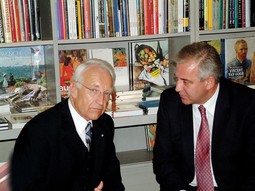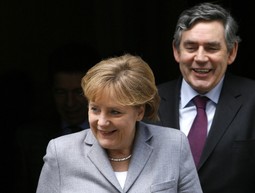Published in Nacional number 696, 2009-03-17
Sanader's US offensive
AFTER CROATIAN JOINS NATO in April, Prime Minister Ivo Sanader will ask the US to support its accession to the European Union, looking to Washington for help in breaking the Slovene blockade
 WITH THE HELP OF WASHINGTON Croatian Prime Minister Ivo Sanader with Speaker of Parliament Luka Bebic (right) and US ambassador to Zagreb, Robert BradtkeWhen Croatia joins NATO in early April Prime Minister Ivo Sanader plans to launch a lobbying campaign in the United States of America, and try, with the help of Washington, to break the Slovenian diplomatic blockade. Top US diplomats confirmed in Zagreb these days their full support of Croatia and their condemnation of Slovenia's behaviour, which is what Sanader needs in the first step to ending the blockade. The feeling in Croatian Government is that the US could put diplomatic pressure on Slovenia, but at the same time wield influence on the European Union to get Berlin, Paris and London to take part in breaking the policy being led in Ljubljana. This information came to Nacional last week from two sources, one of which is in the ranks of Government, and the other in influential diplomatic circles in Zagreb. The sentiments are very similar and boil down to a feeling that Slovenia is carrying out unacceptable blackmail the likes of which have never before been seen in the European Union enlargement process.
WITH THE HELP OF WASHINGTON Croatian Prime Minister Ivo Sanader with Speaker of Parliament Luka Bebic (right) and US ambassador to Zagreb, Robert BradtkeWhen Croatia joins NATO in early April Prime Minister Ivo Sanader plans to launch a lobbying campaign in the United States of America, and try, with the help of Washington, to break the Slovenian diplomatic blockade. Top US diplomats confirmed in Zagreb these days their full support of Croatia and their condemnation of Slovenia's behaviour, which is what Sanader needs in the first step to ending the blockade. The feeling in Croatian Government is that the US could put diplomatic pressure on Slovenia, but at the same time wield influence on the European Union to get Berlin, Paris and London to take part in breaking the policy being led in Ljubljana. This information came to Nacional last week from two sources, one of which is in the ranks of Government, and the other in influential diplomatic circles in Zagreb. The sentiments are very similar and boil down to a feeling that Slovenia is carrying out unacceptable blackmail the likes of which have never before been seen in the European Union enlargement process.
Especially significant is the position of an US diplomat in Europe who, speaking off the record these days, gave their view of the Slovenian-Croatian dispute. Without a doubt expressing the position of US President Barack Obama's administration, this diplomat had two objections to Slovenia's behaviour: firstly, that the blockade being carried out by the government of Borut Pahor, and supported by the Slovene opposition, is harmful and should be stopped, and secondly, that Croatia and its political leadership need to lobby strongly if they wish to break the current blockade in a relatively short period of time and continue the accession negotiations.
Observing ironically that, as a result of the Slovenian obstruction of the ratification of Croatian accession to NATO, the US a few weeks ago "had to put into motion diplomatic mechanisms to resolve the problem," this influential diplomat added that the current blockade of the continuation of talks with the European Union was a continuation of the same, unacceptable, policy. The diplomat described the Slovenian comportment with the quite undiplomatic words "unfair and coercive", and reiterated the opinion of most diplomats, that bilateral border issues need to be resolved before a court.
"The USA supports the Croatian position that border disputes should be resolved before international courts, and that everything else is blackmail. Within Europe there are currently over thirty cases in which the borders are disputed, but nobody would consider causing a blockade and international scandal on that account. And if Slovenia will not back down it is then the task of the European Union to find a way to force them to do so," feels this US diplomat.
US criticism at Slovenia's expense has deeper significance than involvement in an unresolved border dispute between two small countries. The position in Washington is that the current Slovenia-Croatian dispute undermines the stability of South Eastern Europe and threatens to start a new wave of nationalist sentiment. The logic is relatively simple: distancing Croatia from the EU would inevitably lead to a delay on the accession of Serbia, which would according to current forecasts happen in 5 to 10 years, and then, understandably, of Kosovo, Macedonia and Bosnia & Herzegovina. No one is yet thinking of a new war, but everything indicates that the stability of the Balkans is only possible with the engagement of the US and the European Union. In the event of a passive international policy, the situation could become further complicated, especially if one takes into consideration the negative effects of the economic crisis and the recession. For the Americans the responsibility for the development of future events lies with Brussels.
"The EU must see to the stability of South Eastern Europe, and the current Slovene policy is the chief threat to stability. Likewise, the European Union needs to be more engaged when it comes to Ukraine, whose destabilisation could cause global problems," says this professional US diplomat.
There is a very similar thinking in Germany in the political and diplomatic circles concerned with European Union enlargement issues. In the past few years Germany has offered restrained support to Croatia and Angela Merkel's government was occupied by other priorities, but ever since Slovenia radicalised its policy towards Croatia, the opinion that the Slovene blockade is unacceptable has become predominant in Berlin. This was confirmed for Nacional on Monday by a member of the German federal parliament, the Bundestag, who has for years been on its foreign policy committee.
"It is quite clear that Slovenia is carrying out an unacceptable policy. One of the foundations of the EU is the position that a member country cannot because of its own interest prevent the accession of a candidate country. That is the foundation, but things are as they are and now we have to find a way to move on. I personally feel that Slovenia will not have the strength for a long term blockade and that the current state of affairs could last about half a year, that is to say to the start of the autumn. But Croatia has to intersect everything that is happening with a much stronger lobbying effort than to date," Nacional  IVO SANADER with his friend, former CSU leader Edmund Stoiberwas told Monday by a German politician.
IVO SANADER with his friend, former CSU leader Edmund Stoiberwas told Monday by a German politician.
His next suggestion is a very interesting one and boils down to the fact that Sanader has to be careful about where he will seek allies. With the accession of the Eastern European countries over the past five years the EU has become a mammoth and is having an ever more difficult time coordinating its decisions, which is why – says the Bundestag foreign policy committee member – the main effort needs to be directed to several leading European centres. These are Berlin, Paris, London, and possibly Rome and Warsaw. "If you could win over these countries, Slovenia would knuckle under. The support of the Czech Republic, Hungary or Austria will, of course, be welcome, but in this phase it is primary to find allies in Angela Merkel, Gordon Brown or Nicolas Sarkozy because, if anyone can help Croatia, then it is the Prime Ministers of the large European countries," is the feeling in Berlin.
Croatia expects most of the help in Germany to come from Bavaria, where the CSU is the leading party and has traditionally good relations with the HDZ. Former CSU leader Edmund Stoiber is a friend of Sanader's and has advocated a speedy Croatian accession to the EU. In Croatian Government they plan to make use of the good connections with the CSU and to influence Angela Merkel with the help of leading Bavarian politicians. Like all European countries Germany too faces an economic crisis and is only sporadically engaged in enlargement. An effort should be made then, with the help of the CSU, to influence Angela Merkel and to put Croatia in the focus of the interest of German foreign policy.
The evaluations of the situation coming from top officials in Berlin and Washington are no exception. Over the past weeks there is practically no one in Zagreb diplomatic circles that does not support Croatia. Even the representatives of countries that have some reservations concerning Zagreb's cooperation with The Hague are in unison in their criticism of Slovenian national policy. But indicative of the need for caution is the position that the EU lacks the mechanisms needed to put a stop to the Slovenian blockade. On the other hand, in conversation with most of these diplomats one gets the impression that they expect concrete reactions from the most influential countries, upon which their governments would align themselves with this policy.
And they reject, literally a priori, the possibility that has been put forward in some of the local media that a lengthy blockade of Croatia would see Serbia catch up with Croatia, and that, in the end, the two countries would join the EU together. "That really is just speculation. Above all because of the big lead Croatia has, and the many problems Serbia is faced with. And besides, where is the logic for Croatia to wait on its accession because of unresolved border issues with Croatia, and then that we speed up Serbian membership even though it has the same kinds of border problems with Croatia. That kind of policy would be everything but in the spirit of the EU," says a diplomat from one member state.
The problem is that the thinking in Slovenia is reflected by what Ivo Vajgl, the head of Slovenia parliament's foreign policy committee, stated about two months ago when he described the current situation as a "historic opportunity for Slovenia to realise its national interest." Milan Balazic, the state secretary at the Slovenia foreign affairs ministry was of a very similar opinion. "Slovenia cannot allow its vital border issue to remain unresolved. Croatia has to meet the conditions set by the European Union in order to join the EU, including the Slovenia condition – Croatian accession to the EU is conditional on the resolution of the border issue," Balazic said on the Slovenian state TV's prime time news.
Czech Prime Minister Mirek Topolanek, currently presiding over the European Union, expressed an entirely different opinion last Friday. Topolanek said that bringing the enlargement of the Union to a stop and the creation of new iron curtains would be the "road to hell", and added that a delay on the acceptance into membership of the countries of the Western Balkans would be a mistake similar to the one made towards the region in the early 1990s.
 CROATIAN ACCESSION to the EU will depend largely on the support of the leaders of large European countries such as Germany and Great Britain; German Chancellor Angela Merkel with British Prime Minister Gordon BrownHad Slovenia backed down, Topolanek would on 27 March lead a pre-accession conference on Croatia, that would have opened and closed some ten negotiation chapters. But in the current circumstances the entire process has been brought to a standstill, and in Brussels they are still not sure if the conference will be held. Currently the predominant feeling is that they need to wait and see what Ljubljana's intentions are. If the Slovenes, as a show of good will, agree to unblock at least two or three chapters, the conference will go on, otherwise it will not, because it is pointless to bring the leading European politicians to a gathering at which not even the smallest part of the problem would be resolved.
CROATIAN ACCESSION to the EU will depend largely on the support of the leaders of large European countries such as Germany and Great Britain; German Chancellor Angela Merkel with British Prime Minister Gordon BrownHad Slovenia backed down, Topolanek would on 27 March lead a pre-accession conference on Croatia, that would have opened and closed some ten negotiation chapters. But in the current circumstances the entire process has been brought to a standstill, and in Brussels they are still not sure if the conference will be held. Currently the predominant feeling is that they need to wait and see what Ljubljana's intentions are. If the Slovenes, as a show of good will, agree to unblock at least two or three chapters, the conference will go on, otherwise it will not, because it is pointless to bring the leading European politicians to a gathering at which not even the smallest part of the problem would be resolved.
And even though Croatia would lose a few more weeks with a postponement of the pre-accession conference, this kind of development would not be entirely negative. Above all because it would once again confirm that Slovenia is leading a hard-line policy that is irritating to almost all in the European Union, but also because of a better lobbying preparation for upcoming meetings with the leadership of Germany and other countries.
Sanader's goal is clear in and of itself: he wants to get the explicit support above all of the US and a group of large European countries for Croatian accession to the EU, and he will ask them to put pressure on Slovenia which is blocking the negotiations between Zagreb and Brussels. In this regard he has agreed with President Stipe Mesic and the leaders of the majority of parliamentary parties, who support the plan that says that there can be no connection between the border dispute and the negotiations with the European Union, and that mediation has to lead to one of the international judicial bodies.
In order to continue and to get a chance to complete the negotiations, Sanader is prepared to undertake many unpopular measures. These include accepting all of the demands coming from the EU, from handing over the so-called artillery logs to the resolution of the shipbuilding issue, and even entering into a conflict with the HSS, whose Minister Bozidar Pankretic has adopted a very firm position in the negotiations on agricultural policy, But if, figuratively speaking, the doors of the EU open in the upcoming lobbying effort, Sanader is ready to try to bring about a softening of the HSS position.
One has to remain realistic in it all, since the current situation in the European Union does not work in favour of Croatian ambitions. Above all because of the economic crisis, which is an absolute priority in all countries, and there is no sign for the moment that the recession will abate any time soon. That means that a couple of dozen kilometres in the Bay of Piran is a secondary problem for the governments in Berlin and Paris, and is of no interest to the general public in these countries. And the election campaign for the next European Parliament kicks off soon, and all of the leading politicians will focus on the campaign. The elections are scheduled for the start of the autumn, which is followed by the constitution of a new European Commission, with much lobbying and negotiation, the adoption of new strategies, and in it all Croatia will be destined to wait out the developments in Brussels.
That is the scenario Slovenia is counting on. If they can drag things out to the summer, when the Czech presidency of the Union finishes, the situation could be frozen for quite some time. The Czech Republic will be replaced by Sweden which is numbered among the countries that, on account of relations with the tribunal in The Hague and the situation with human and returnee rights, has a reserved attitude towards Croatian accession to the EU, and it is not very likely that Stockholm will put Croatian accession to the EU as one of the priorities of its six-month presidency.
In these circumstances there is not much time for Ivo Sander's announced lobbying offensive. Even the best-case scenario, which would see Croatia becoming a member of NATO in two and a half weeks, presumes the first half of April as the deadline in which Angela Merkel, Gordon Brown, and Silvio Berlusconi need to be convinced that an unblocking of the negotiations is just as important for the European Union as it is for Croatia.
Related articles
Sanader’s eight fear SDP — Won’t bring down Government
Despite forecasts that he would, former Croatian Prime Minister Ivo Sanader, who recently took his seat in Parliament, will not work from the house… Više
Latest news
-
28.10.2010. / 14:15
'A profitable INA is in everyone's interest'
-
28.10.2010. / 09:38
Sanader’s eight fear SDP — Won’t bring down Government
-
21.10.2010. / 15:02
Interior Ministry turned a blind eye on Pukanic assassination
-
20.10.2010. / 09:34
Barisic could bankrupt HDZ




